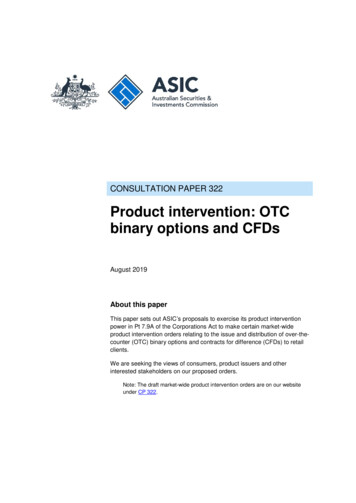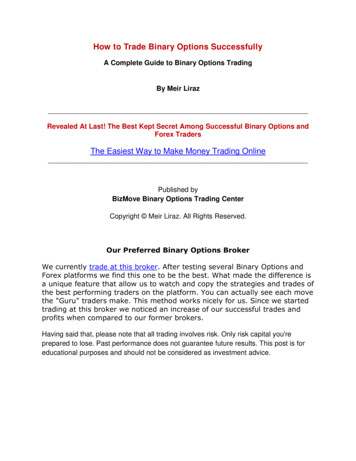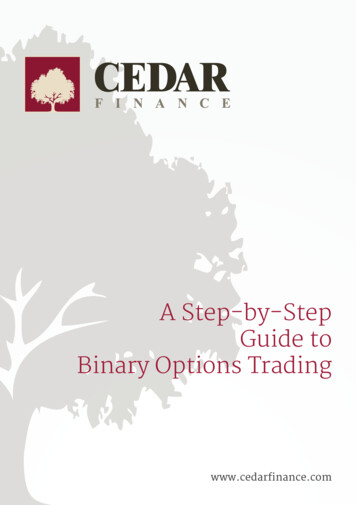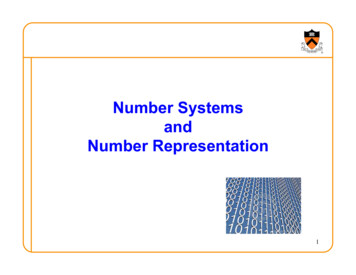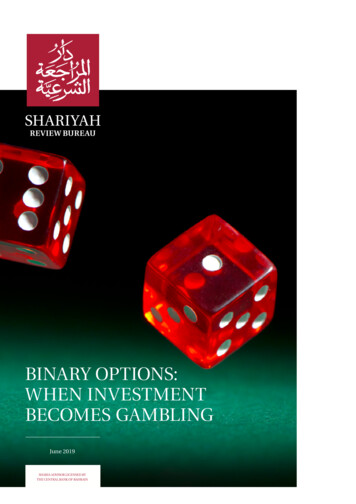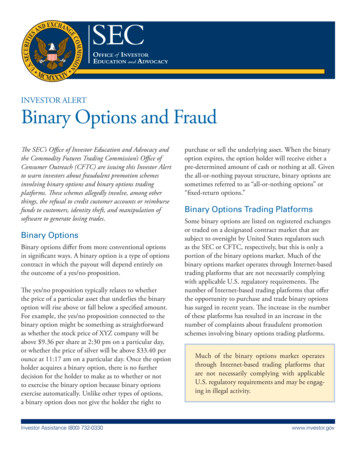
Transcription
Investor AlertBinary options and FraudThe SEC’s Office of Investor Education and Advocacy andthe Commodity Futures Trading Commission’s Office ofConsumer Outreach (CFTC) are issuing this Investor Alertto warn investors about fraudulent promotion schemesinvolving binary options and binary options tradingplatforms. These schemes allegedly involve, among otherthings, the refusal to credit customer accounts or reimbursefunds to customers, identity theft, and manipulation ofsoftware to generate losing trades.Binary OptionsBinary options differ from more conventional optionsin significant ways. A binary option is a type of optionscontract in which the payout will depend entirely onthe outcome of a yes/no proposition.The yes/no proposition typically relates to whetherthe price of a particular asset that underlies the binaryoption will rise above or fall below a specified amount.For example, the yes/no proposition connected to thebinary option might be something as straightforwardas whether the stock price of XYZ company will beabove 9.36 per share at 2:30 pm on a particular day,or whether the price of silver will be above 33.40 perounce at 11:17 am on a particular day. once the optionholder acquires a binary option, there is no furtherdecision for the holder to make as to whether or notto exercise the binary option because binary optionsexercise automatically. Unlike other types of options,a binary option does not give the holder the right toInvestor Assistance (800) 732-0330purchase or sell the underlying asset. When the binaryoption expires, the option holder will receive either apre-determined amount of cash or nothing at all. Giventhe all-or-nothing payout structure, binary options aresometimes referred to as “all-or-nothing options” or“fixed-return options.”Binary Options Trading Platformssome binary options are listed on registered exchangesor traded on a designated contract market that aresubject to oversight by United states regulators suchas the seC or CFtC, respectively, but this is only aportion of the binary options market. Much of thebinary options market operates through Internet-basedtrading platforms that are not necessarily complyingwith applicable U.s. regulatory requirements. Thenumber of Internet-based trading platforms that offerthe opportunity to purchase and trade binary optionshas surged in recent years. The increase in the numberof these platforms has resulted in an increase in thenumber of complaints about fraudulent promotionschemes involving binary options trading platforms.Much of the binary options market operatesthrough Internet-based trading platforms thatare not necessarily complying with applicableU.s. regulatory requirements and may be engaging in illegal activity.www.investor.gov
Investor Complaints Relating toFraudulent Binary Options TradingPlatformstypically, a binary options Internet-based tradingplatform will ask a customer to deposit a sum of moneyto buy a binary option call or put contract. For example,a customer may be asked to pay 50 for a binary optioncontract that promises a 50% return if the stock priceof XYZ company is above 5 per share when theoption expires.The seC and CFtC have received numerous complaintsof fraud associated with websites that offer an opportunityto buy or trade binary options through Internet-basedtrading platforms. The complaints fall into at least threecategories: refusal to credit customer accounts or reimbursefunds to customers; identity theft; and manipulation ofsoftware to generate losing trades.If the outcome of the yes/no proposition (in this case,that the share price of XYZ company will be above 5 per share at the specified time) is satisfied and thecustomer is entitled to receive the promised return, thebinary option is said to expire “in the money.” If, however,the outcome of the yes/no proposition is not satisfied,the binary option is said to expire “out of the money,”and the customer may lose the entire deposited sum.The first category of alleged fraud involves the refusal ofcertain Internet-based binary options trading platformsto credit customer accounts or reimburse funds afteraccepting customer money. These complaints typicallyinvolve customers who have deposited money intotheir binary options trading account and who are thenencouraged by “brokers” over the telephone to depositadditional funds into the customer account. Whencustomers later attempt to withdraw their originaldeposit or the return they have been promised, thetrading platforms allegedly cancel customers’ withdrawalrequests, refuse to credit their accounts, or ignore theirtelephone calls and emails.There are variations of binary option contracts in whicha binary option that expires out of the money may entitlethe customer to receive a refund of some small portion ofthe deposit—for example, 5%—but that is not typicallythe case.In fact, some binary options Internet-based trading platforms may overstate the average return on investment byadvertising a higher average return on investment than acustomer should expect, given the payout structure. Forinstance, in the example above, assuming a 50/50 chanceof winning, the payout structure has been designed insuch a way that the expected return on investment isactually negative, resulting in a net loss to the customer.This is because the consequence if the option expires outof the money (approximately a 100% loss) significantlyoutweighs the payout if the option expires in the money(approximately a 50% gain). In other words, in theexample above, an investor could expect, on average,to lose money.The second category of alleged fraud involves identitytheft. For example, some complaints allege that certainInternet-based binary options trading platforms maybe collecting customer information such as credit cardand driver’s license data for unspecified uses. If a binaryoptions Internet-based trading platform requestsphotocopies of your credit card, driver’s license, orother personal data, do not provide the information.The third category of alleged fraud involves themanipulation of the binary options trading softwareto generate losing trades. These complaints allege thatthe Internet-based binary options trading platformsInvestor Assistance (800) 732-0330www.investor.gov2
manipulate the trading software to distort binary optionsprices and payouts. For example, when a customer’strade is “winning,” the countdown to expiration isextended arbitrarily until the trade becomes a loss.If a binary options trading platform is offering to buyor sell securities, effecting transactions in securities,and/or receiving transaction-based compensation (suchas commissions), it likely should be registered withthe SEC. To determine whether a particular tradingplatform is registered with the SEC as a broker-dealer,visit the FINRA BrokerCheck website eck/).Unregistered Transactions, Operations,Broker-Dealers, or Trading Exchanges;Illegal Options TransactionsIn addition to ongoing fraudulent activity, many binaryoptions trading platforms may be operating in violationof other applicable laws and regulations, including certainregistration and regulatory requirements of the SEC andCFTC, as described below.Some binary options trading platforms may also beoperating as unregistered securities exchanges. Thiswould be the case if they matched orders in securitiesof multiple buyers and sellers using established nondiscretionary methods. However, there are cases wherea registered broker-dealer with a trading system orplatform may legitimately have no obligation to registeras an exchange.Certain Registration and RegulatoryRequirements of the SECFor example, some binary options may be securities.Under the federal securities laws, a company may notlawfully offer or sell securities unless the offer and salehave been registered with the SEC or an exemption fromsuch registration applies. For example, if the terms ofa binary option contract provide for a specified returnbased on the price of a company’s securities, the binaryoption contract is a security and may not be offered orsold without registration, unless an exemption fromregistration is available. If there is no registration orexemption, then the offer or sale of the binary optionto you would be illegal.Certain Registration and RegulatoryRequirements of the CFTCIt is illegal for entities to solicit, accept offers, offerto or enter into commodity options transactions (forexample, foreign currencies, metals such as gold andsilver, and agricultural products such as wheat or corn)with U.S. citizens, unless those options transactions areconducted on a designated contract market, an exemptboard of trade, or a bona fide foreign board of trade,or are conducted with U.S. customers who have a networth that exceeds 5 million.If any of the products offered by binary options tradingplatforms are security-based swaps, additional requirements will apply.To see the most recent list of exchanges that are designatedas contract markets, check the CFTC website. Therecurrently are only three designated contract marketsoffering binary options in the U.S.: Cantor ExchangeLP; Chicago Mercantile Exchange, Inc.; and the NorthAmerican Derivatives Exchange, Inc. All other entitiesoffering binary options that are commodity optionstransactions are doing so illegally.In addition, some binary options trading platformsmay be operating as unregistered broker-dealers. Aperson who engages in the business of effecting securities transactions for the accounts of others in the U.S.generally must register with the SEC as a broker-dealer.Investor Assistance (800) 732-0330www.investor.gov3
Further, entities that solicit or accept orders forcommodity options transactions and accept, amongother things, money to margin, guarantee, or securethe commodity options transactions must register as aFutures Commission Merchant. Entities that act asthe counterparty (that is, they take the other side of thetransaction from the customer as opposed to matchingorders) for foreign currency options transactions forcustomers with a net worth of less than 5 millionmust register as a Retail Foreign Exchange Dealer. Because of their lack of compliance with applicablelaws, if you purchase binary options offered bypersons or entities that are not registered with orsubject to the oversight of a U.S. regulator, youmay not have the full benefit of the safeguardsof the federal securities and commodities lawsthat have been put in place to protect investors,as some safeguards and remedies are availableonly in the context of registered offerings. Inaddition, individual investors may not be ableto pursue, on their own, some remedies that areavailable for unregistered offerings. Final Words Remember—much of the binary options marketoperates through Internet-based trading platformsthat are not necessarily complying with applicableU.S. regulatory requirements and may be engagingin illegal activity. Do not invest in something that you do not understand. If you cannot explain the investment opportunity in a few words and in an understandable way,you may need to reconsider the potential investment. Before investing in binary options, you should takethe following precautions:Investor Assistance (800) 732-0330Check to see if the binary options tradingplatform has registered the offer and sale of theproduct with the SEC. Registration providesinvestors access to key information about theterms of the product being offered. You canuse EDGAR (www.sec.gov/edgar/searchedgar/webusers.htm) to determine whether an issuerhas registered the offer and sale of a particularproduct with the SEC.Check to see if the binary options tradingplatform itself is registered as an exchange. Todetermine whether the platform is registered asan exchange, you can check the SEC websiteregarding Exchanges at Check to see if the binary options tradingplatform is a designated contract market. Todetermine whether an entity is a designatedcontract market, you can check the CFTCwebsite at http://sirt.cftc.gov/SIRT/SIRT.aspx?Topic TradingOrganizations&implicit true&type DCM&CustomColumnDisplay TTTTTTTT.Finally, before investing, check out the registrationstatus and background of any firm or financialprofessional you are considering dealing with atFINRA BrokerCheck eck/) and BASIC Search (www.nfa.futures.org/basicnet), the National Futures Association Background Affiliation Status InformationCenter. If you cannot verify that they are registered,don’t trade with them, don’t give them any money,and don’t share your personal information with them.www.investor.gov4
Related InformationEDGAR (www.sec.gov/edgar/searchedgar/webusers.htm)FINRA BrokerCheck eck/ )BASIC Search (www.nfa.futures.org/basicnet)SEC Publication: Ask Questions -should-ask.pdf )SEC Investor Alert: Social Media and Investing—Avoiding Fraud df )CFTC Consumer Protection (www.CFTC.gov/consumer protection)International Organization of Securities Commissions (IOSCO) (www.iosco.org/lists/index.cfm?section general )The Office of Investor Education and Advocacy has provided this information as a service to investors. It is neithera legal interpretation nor a statement of SEC policy. If you have questions concerning the meaning or applicationof a particular law or rule, please consult with an attorney who specializes in securities law.SEC Pub. No. 148 (6/13)
involving binary options and binary options trading platforms. These schemes allegedly involve, among other things, the refusal to credit customer accounts or reimburse funds to customers, identity theft, and manipulation of software to generate losing trades. Binary Options. Binary options differ from more c


